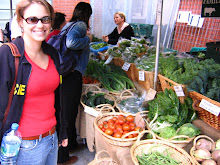Tonight for supper I ate baked wild salmon, mashed sweet potatoes and sauteed kale with blueberries and yogurt for desert, topped off with tea. I am literally bursting with micro-nutrients. All these foods just happened to be what I was craving for supper, and they all just happen to be available locally. (More on how the salmon is local in a minute.)
All these foods have also been identified as "superfoods" by one dietetic association or another. This just means that these foods will cure what ails you, namely cancer. Crammed full of quaint (or scary) sounding nutrients like "flavonoids" and "carotenoids" these foods have everything you need to live forever. Eating well never tasted so good. This food is "good to think" too, to borrow from anthropologist Levi-Strauss, because it's come from local, organic sources.
I know, I know, you're saying, I get the sweet potatoes, but wild salmon, in Georgia? Come on. Well, climate change has not brought salmon to Georgia, but Athens Locally Grown has. A local family goes up to salmon country in Alaska and brings back the catch to sell here through ALG. While it's not local in the strict sense of the word, it does a lot of the work that "local" consumption/production does.
We buy local because it completes the three legged stool of justice--social, economic and environmental--in sustainability. It is a complete and functional system within which people are compensated fairly, social capital is built through direct connections, and the ecology of the environment is protected to the greatest extent that it can be. Buying direct is almost as good as buying local when it provides income to a family business and doesn't exploit workers or treat animals inhumanely. And let's face it, the salmon I just ate wasn't going to live a long peaceful life into its reclining years. It was likely heading directly to death after spawning in the river in which it was caught. The ecological piece is obviously lacking in this purchase, since this food came from more than a thousand miles away from here. That part troubles me enough to keep this food a luxury, not a staple. (This also makes me want to cry, or move to Alaska).
As I have found in my research on fair trade and organic food products, the interference of middle-people creates a lot of the problems in our current food system. (And the minor detail that we have to *buy* food.) When food is for sale, and lots of people get a cut, the least powerful actors take the biggest hit. In the case of organic bananas, these are Haitian workers who have little more than the shirt on their back. In the case of organic produce in the United States it is migrant workers in the same situation, who often work for less than minimum wage.
The best way I see to work out this food puzzle is that I have to eat healthy, and I have to eat righteously, which means eating with ethics and with an eye to justice. This means, that I can't place animal lives above human ones. No way. I'll eat a lot of animals before I knowingly consume something (like a banana) that puts workers lives at risk and permanently erodes their life chances in the same way that slavery has and still does. Fortunately there are some good options for eating healthy food that doesn't come at the expense of human lives. Even if it happens to come from across the continent, I'll take it.
The beauty of all this lies in the fact that these locally produced and directly traded foods are *the healthiest* foods on the planet! I didn't buy any of these things because I knew they were good for me. I bought them because they were delicious and righteous. The fact that they will make me live forever is just the blueberry on my yogurt.
Live, eat and love righteous.
Sunday, February 6, 2011
Subscribe to:
Post Comments (Atom)

No comments:
Post a Comment